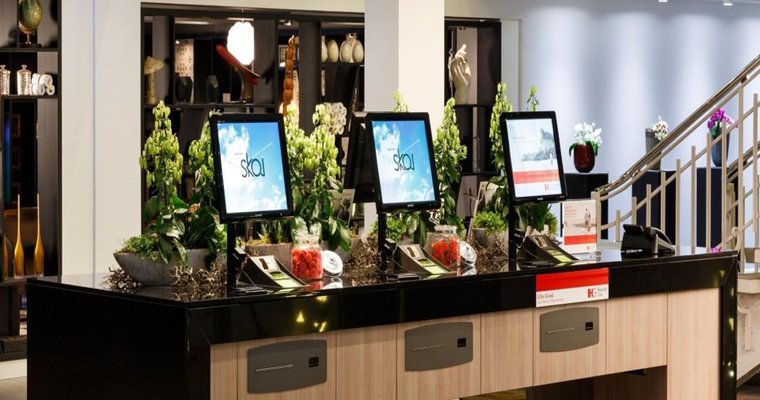Contactless technology has played a big role in helping hotels streamline their operations and deliver a more personalized guest experience.
 The Holiday Inn in Brussels, Belgium offers self-check-in kiosks. Photo courtesy of Ariane Systems.
The Holiday Inn in Brussels, Belgium offers self-check-in kiosks. Photo courtesy of Ariane Systems.
Checking in and out of a hotel has long been one of the greatest points of friction for travelers.
It’s also one of several friction points hotels have been attacking aggressively since the pandemic, according to a survey of 525 hoteliers worldwide conducted by the New York University Jonathan M. Tisch Center of Hospitality, sponsored by Stayntouch, a global provider of hotel property management systems and contactless technology.
Self-service technology, including self-serve kiosks, contactless check-in/out and mobile check-in, collectively jumped 66% during the pandemic, according to the survey, even though traditional front desk check-in was still the most common way guests check in (60%), followed by assisted self-service (31.5%), self-service using a mobile phone (5.4%), and fully self service (2.7%).
Nearly 92% of hoteliers surveyed said guests have increased acceptance of technology and expect contactless options. About three quarters of the survey respondents said contactless will be a long-term trend.
In addition to contactless check-in/out, hotels also expanded into mobile keys, digital payments, in-room technology, chatbots, guest surveys and unattended convenience stores.
«Technology has played a pivotal role in helping hotels streamline their operations and deliver a more personalized guest experience,» Michael Heflin, chief revenue officer at Stayntouch, said in a prepared statement.
Self-check-in/out tops hotel technology outlays
Among all the technologies considered, self-check-in/out, which includes self-serve kiosks and mobile check-in, grew the most during the pandemic, according to the survey.
Among the 75% of hotels offering self-check-in/out technology, nearly half (48.6% of all hotels queried) introduced the technology prior to the pandemic, 25.3% implemented it during the pandemic and 11% said they plan to deploy it in 2022.
In 2022, hospitality technology is expected to increase by 19%.
Where branded hotels were more proactive introducing self-serve check-in/out pre-pandemic, according to the survey, independent hotels caught up during the pandemic.
While 57.4% of branded hotels introduced self-serve check-in prior to the pandemic compared to 22.6% of independent hotels, 31.9% of independent hotels introduced it during the pandemic and 15.3% plan to introduce it in 2022.
A labor saving
 |
| Laurent Cardot |
An important benefit of self-check-in/out is it helps a hotel operate with reduced labor, said Laurent Cardot, founder and CEO of France based Ariane Systems, which specializes in providing self-check-in for hotels. Operating with fewer staff has become especially critical since the pandemic.
«You need to somehow lower operating costs, and the number one cost in hotels outside of real estate is people,» Cardot told Kiosk Marketplace in a phone interview. «Reducing the number of people is crucial for hotels in order to maintain a decent level of profitability.»
According to the survey, hotels view the front desk as the department that can best operate with a smaller staff, as nearly half (43.5%) of respondents said the front desk can operate with a smaller staff. The other departments considered included sales and marketing, food and beverage, housekeeping and maintenance, human resources and information technology.
Mobile check-in versus kiosks?
While more than a quarter of respondents introduced mobile check-in during the pandemic, the responses indicated hotels are relying more on self-check-in/out kiosks, given that 31.5% of guests are using assisted self-service and 2.7% use fully self-service compared to 5.4% using mobile check-in.
Cardot at Ariane Systems said mobile self-check-in will not replace self-check-in kiosks.
«There are a lot of constraints, especially in the U.S., where it’s not that easy,» Cardot said. «It is way more secure and cheaper in the U.S. to do a card present transaction rather than doing a web payment.
«Number two, a lot of hotels still want to verify ID, which you cannot really do just by doing mobile check-in,» he said.
Thirdly, according to Cardot, one of the top selling points for mobile check-in was to also provide a mobile room key, which requires downloading an app. Downloading an app for a large hotel chain offers the frequent traveler a convenience, he said, but an independent hotel has a harder time convincing a guest to download an app.
«Why would I spend five minutes to avoid just picking up a key from them?» he asked. «Up till now, mobile key has not been a success.»
Combination mobile/kiosks works best
«You get maximum results by combining them (mobile and kiosks),» Cardot said. «That’s the winning combination. You can start the mobile check-in (on an app), finish the mobile check-in on a kiosk, or you can do the entire (task) on the mobile or you can do it on a kiosk.»
 |
| Sean Houchin |
Sean Houchin, product manager for Elatec Inc., a provider of solutions related to short range wireless readers and writers, agreed that self-serve kiosks can work in tandem with credentialed smartphones in a hotel environment.
«When guests check-in at the reception kiosk with their phone, their authentication app can be updated with information about their room assignment,» Houchin said. «Now they can unlock their room with the phone.»
 |
| Impulsify reported a 235% increase in «grab-and-go» hotel deployments. |
Hotel convenience markets
Another area where self-serve kiosks are expanding rapidly in hotels is in onsite convenience markets. The «grab-and-go» saves the guest from having to take their purchase to the front desk to pay.
Impulsify, a software provider specializing in hotel «grab-and-go,» reported a 235% increase in deployments of its ShopPoP self-service kiosk in 2021.
«It’s a lobby retail market that offers cold beverages, some prepared food, snacks, ice cream, just a way to get a packaged food on property,» said company CEO Janine Williams in a phone interview. «They are an open retail outlet in the common area of the lobby.»
Impulsify provides a Windows based touchscreen kiosk that allows the guest to scan the UPC code at the kiosk and pay with their room key or a credit card. Impulsify customized the hardware from POS-X (now owned by Custom America) to include a card reader and barcode scanner.
 |
| Janine Williams |
In the past year, the company has also introduced touchless transaction that allows the guest to scan a QR code on the screen and use a keypad on their smartphone.
«A hotel is its own organizational ecosystem,» Houchin at Elatec said. «Self-service conveniences can and should be able to extend to parking lot access, use of the hotel EV chargers, purchases in the restaurant or bodega or vending machines, document printing in the business office, bike-sharing and more.»
For an update on how the coronavirus pandemic has affected kiosks, click here.
Photo courtesy of Impulsify.

